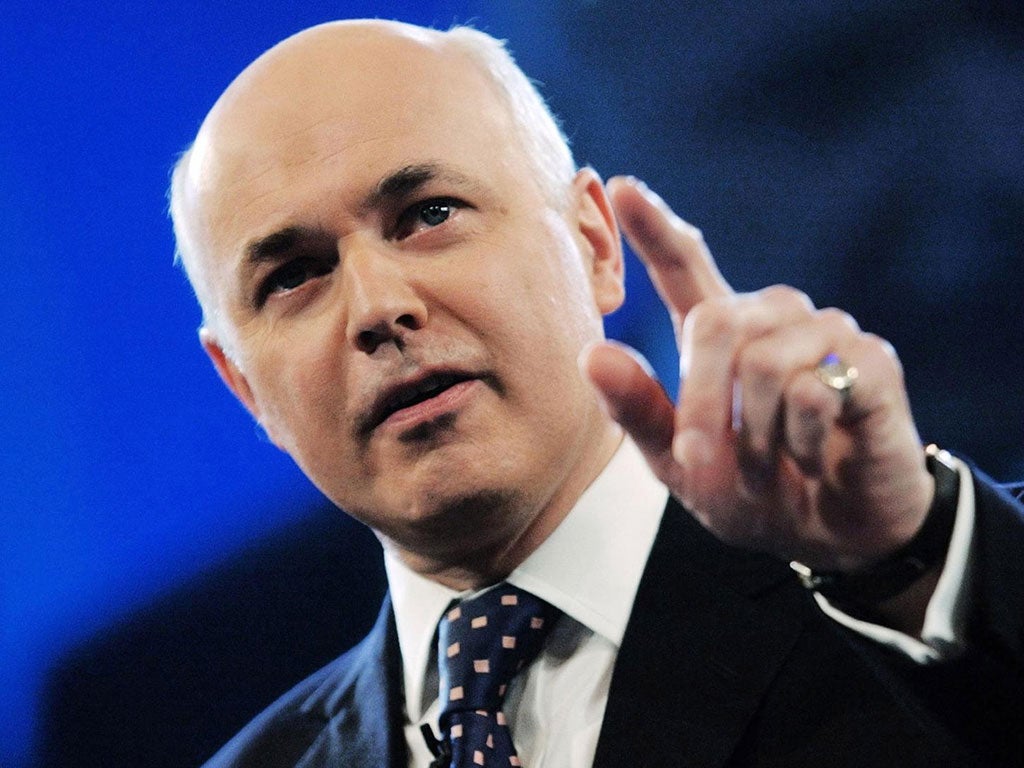Andrew Grice: Labour must bite welfare bullet to match the public mood
Inside Westminster


David Cameron had a welcome break from the endless controversy over his Government's health reforms on Wednesday when he issued a triumphalist statement after Parliament passed the Welfare Reform Bill. Hailing it as "an historic step in the biggest welfare revolution in over 60 years", he added: "Past governments have talked about reform while watching the benefits bill sky rocket and generations languish on the dole and dependency. This Government is delivering it. Our new law will mark the end of the culture that said a life on benefits was an acceptable alternative to work."
At the heart of the Bill is the £26,000-a-year cap on the amount of benefits that can be claimed by a family – based on the average salary of a working family – and a new universal credit that will streamline the system.
What Mr Cameron didn't mention is that the Government was forced to make significant changes to secure the Bill's safe passage, notably through the House of Lords. The Liberal Democrats quietly played a pivotal role in smoothing over the rough edges of the welfare shake-up – in sharp contrast to their public demands for concessions on the trouble-hit Health and Social Care Bill.
Whitehall sources tell me that the savings from the benefits cap, originally estimated at £490m over the financial years spanning 2013-15, have been halved to £245m by the changes during the Bill's passage. A nine-month grace period for people previously in work will cost the Government £65m; setting up a discretionary fund for emergency payments a further £130m and early entry into the Work Programme another £50m.
George Osborne might not be amused by that as he counts his beans and finds his jar decidedly empty as he prepares for his March 21 Budget. Yet the Chancellor approved the concessions and may regard them as a relatively small price to pay for getting through reforms that will save billions in the long run. And the Lords backed down over other costly demands.
Certainly Mr Osborne and Iain Duncan Smith, the Work and Pensions Secretary (pictured), have won the political argument over welfare reform. The £500-a-week cap is the cleverest policy the Coalition has cooked up so far. To an ordinary voter in work who would have to earn £35,000 before tax to take home £26,000 a year, it sounds an awful lot of money to be paying to 67,000 households on benefits.
The ceiling is very popular with the public and destabilised the Labour Opposition, which managed to come up with a policy I still don't understand – supporting a cap in principle but not this one in practice.
Old attitudes persist in some parts of Labour's ranks and I hear that Liam Byrne, the Blairite shadow Work and Pensions Secretary, was given a hard time recently when he spelt out his approach to the Parliamentary Labour Party. There is a risk of Labour becoming out of step with the voters at a time when attitudes to people on benefits are hardening. Traditionally the public is more sympathetic to those at the bottom of the pile during a recession – and less tolerant in good times when there are plenty of jobs around -- but there is evidence of a permanent shift in attitudes which mean that the UK has become less tolerant of those who rely on the state.
Perhaps this change has been hardened by the crude stigmatisation of so-called scroungers that Tory ministers have encouraged since the last election. The interesting thing is that the Tories might not need to do it because of the new public mood..
Indeed, a YouGov survey for Prospect magazine shows why the Coalition's reforms are popular and contains a stark warning for Ed Miliband. Three out of four people (74 per cent) agree that the Government pays out too much in benefits and want welfare levels reduced.
Labour has started to sketch out what a new model welfare state might look like in an age of austerity. Its priorities are child and social care. But wise Labour figures know the party will need to bite the bullet by offering a new "something for something" deal to meet the public mood. The obvious way would be to put more responsibilities on those capable of work to seek it.
Many Labour folk won't like it but such an approach would create opportunities. Labour is instinctively trusted by the voters on the NHS in a way the Tories are not. Conversely, the Tories are trusted on welfare but Labour has much work to do.
Although Mr Miliband can hardly be blamed for rubbing salt in Mr Cameron's self-inflicted wounds on the NHS, there may not be many extra votes for Labour to win on health. In contrast, a new approach by Labour to welfare would be counter-intuitive and, if noticed by the voters, could pay dividends.

Join our commenting forum
Join thought-provoking conversations, follow other Independent readers and see their replies